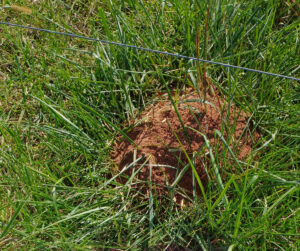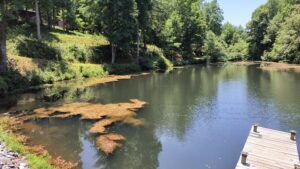Fire Ants, Melons and Fish, Oh My
go.ncsu.edu/readext?1013249
en Español / em Português
El inglés es el idioma de control de esta página. En la medida en que haya algún conflicto entre la traducción al inglés y la traducción, el inglés prevalece.
Al hacer clic en el enlace de traducción se activa un servicio de traducción gratuito para convertir la página al español. Al igual que con cualquier traducción por Internet, la conversión no es sensible al contexto y puede que no traduzca el texto en su significado original. NC State Extension no garantiza la exactitud del texto traducido. Por favor, tenga en cuenta que algunas aplicaciones y/o servicios pueden no funcionar como se espera cuando se traducen.
Português
Inglês é o idioma de controle desta página. Na medida que haja algum conflito entre o texto original em Inglês e a tradução, o Inglês prevalece.
Ao clicar no link de tradução, um serviço gratuito de tradução será ativado para converter a página para o Português. Como em qualquer tradução pela internet, a conversão não é sensivel ao contexto e pode não ocorrer a tradução para o significado orginal. O serviço de Extensão da Carolina do Norte (NC State Extension) não garante a exatidão do texto traduzido. Por favor, observe que algumas funções ou serviços podem não funcionar como esperado após a tradução.
English
English is the controlling language of this page. To the extent there is any conflict between the English text and the translation, English controls.
Clicking on the translation link activates a free translation service to convert the page to Spanish. As with any Internet translation, the conversion is not context-sensitive and may not translate the text to its original meaning. NC State Extension does not guarantee the accuracy of the translated text. Please note that some applications and/or services may not function as expected when translated.
Collapse ▲Several interesting questions came into the Caldwell Extension Center this week. I’d like to share three of them with you. I hope you find these questions and answers helpful.
Question: I have horses and donkeys. There are fire ants in my pasture. Can I use fipronil granules in the pasture? Will this hurt my animals?
Answer: Fipronil is the active ingredient in Bayer’s Topchoice Insecticide. This is a great product for managing insects in turf and landscape beds. However, fipronil granules are not labeled for use in pastures or hay fields.

Fire ants in pastures can be controlled with fire ant bait products. For large areas baits are effective and economical.
When the US Environmental Protection Agency (EPA) registers pesticides, it is for specific sites. For example, Bayer Topchoice is labeled for turfgrass, including golf turf, sports fields, commercial lawns, cemeteries, parks, campsites, recreational areas, home lawns, school grounds, and sod farms, as well as landscape beds and container nurseries. Pastures and hay fields are not on the label. Even though it will control fire ants, this product can not be used in pastures, The application site has to be listed on the label to be used in that situation. The pest does not actually have to be listed on the label for it to be legally applied.
Fipronil is also the active ingredient in many other formulations for the control of flea & ticks on companion animals, cockroach control indoors, and soil drench foundation treatment for termite control during construction. In each case, the label indicates where the product can be applied.
Since they are not food animals, horses can add a twist to this question. However, since pastures are not on the label, it should not be used even in a horse pasture. Also, the application rate of Topchoice is 87 pounds of the product per acre. This product sells for $160 per 50 pounds, so the treatment cost per acre is $278. The product is also a “restricted use” pesticide, so the applicator needs to be licensed by NC Department of Agriculture and Consumer services to buy and apply this product.
A better approach when treating large acreage as well as pastures for fire ants is to use a bait product. There are several baits that work well on fire ants. All the baits I am familiar with have a 1.5 pounds per acre application rate, and the treatment cost is $15 to $25 per acre. Dr. Terri Billeisen maintains a good web page that covers what can be used in pastures.
The use of brand names and/or any mention or listing of specific commercial products or services herein is solely for educational purposes and does not imply endorsement by NC State University or our partners, nor discrimination against similar brands, products, or services not mentioned.
Question: I have a weed problem in my pond. Can I add grass carp to my pond?
Answer: Grass carp can be a great solution to some pond weed problems. Knowing what weed you have in the pond is the first step. Grass carp are not able to feed on all aquatic vegetation. Also, grass carp require a permit from the NC Department of Wildlife. The permit is free. The District Wildlife Biologist issues the permit and can help determine if sterile grass carp will improve the pond.

Some pond weeds can be controlled with sterile grass carp, but a free permit from the NC Wildlife Commission is required.
The NC Department of Wildlife maintains a web page that addresses this topic.
Question: How do you pick a ripe watermelon?
Answer: There are some techniques to use when choosing a watermelon. They aren’t foolproof but should make your choice a bit more scientific.
- The melon should be heavy and the rind should be dark.
- The underside should be a creamy color – not yellow (too ripe) or white (not ripe).
- The surface color should be dull, not shiny.
- There should be little contrast between the color of the stripes.
- When picking from the field, the curly tendril closest to the fruit should be brown, but the rest of the vine should be green.
Try these tips next time you select a watermelon.
NC State Extension’s Homegrown video education series demonstrates how to select a ripe watermelon.
*Seth Nagy is the Caldwell County Cooperative Extension Director.The Caldwell County Cooperative Extension Center, 120 Hospital Ave., #1 in Lenoir, provides access to resources of N.C. State University and N.C. A&T State University through educational programs and publications. Staff can be reached in person or online.




